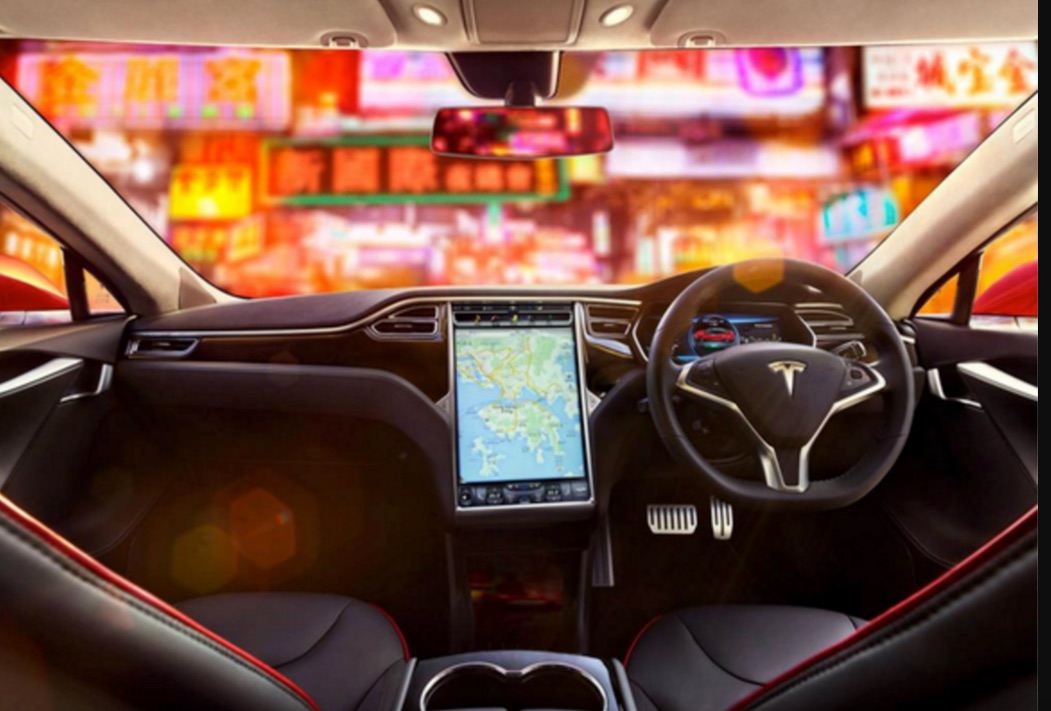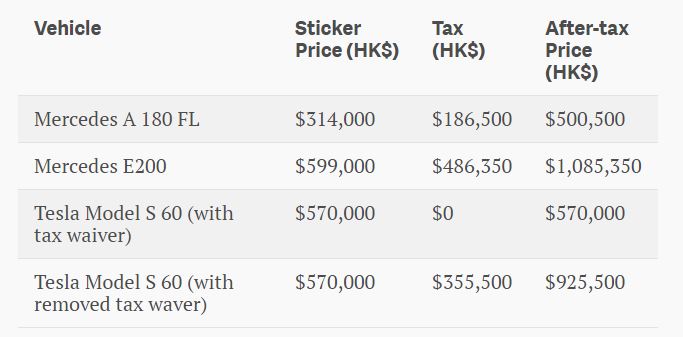News
Tesla and Hong Kong: Once ideal companions for a city of contrasts

Luxury automobile owners in Hong Kong have enthusiastically embraced the Tesla brand over the past three years. In large part, that’s because Tesla vehicles were not part of the pool of new car purchases that incurred a tax often equal to or exceeding a car’s full sticker price. Tesla had benefited from a nearly twenty year old exemption from this tax as part of the electric vehicle category.
However, the allure of a Tesla as a luxury car with great value and zero emissions may be fading for Tesla consumers.
During a speech about the annual budget for 2017, financial secretary Paul Chan announced that the government will lift a long-standing waiver for electric cars on new vehicle registration taxes. It will be replaced by a maximum deduction that is equivalent to about $12,500 U.S. As there had been so few electric car choices in the Hong Kong market, the original heavy tax on new private car purchases, which had been imposed as a measure to mitigate emissions and reduce traffic, really didn’t amount to much lost tax revenue for the government in its early years.
That is, until Tesla came to town. Car buyers soon found that it could purchase an automobile with the panache of a Mercedes but spend about half the amount. Tesla owners would also have the added benefit of feeling better about their contributions to a city that suffers from heavy air pollution.
Hong Kong’s love for Tesla
Hong Kong is a fascinating place. Calm and orderly crowds. Ample green spaces interspersed between and on top a vertical city. Open land just on the city outskirts. An area that feels like one giant interconnected shopping mall with a density of luxury brand stores. Three Tiffany’s Flagship stores. Eight Hermès shops. Thirteen Armani stores and the Armani Nightclub. In Hong Kong, the new and contemporary complement the ancient and traditional: temples beside skyscrapers, luxury shops flanking Chinese pharmacies, double-decker trams and mini-buses puttering alongside Teslas.
The Tesla brand has fit nicely into the Hong Kong cultural melting pot of neon signs and urban landscape. With networking as an integral part of life and thirty-somethings working and playing hard in a hedonistic lifestyle, Tesla arrived in Hong Kong at the right time. A top tax bracket on income set at 17.5% didn’t hurt sales, either.
Electric vehicle (EV) registrations in Hong Kong catapulted in the last few years. That affection for EVs may be coming to an end now that the government is revising the regulations that inspired their popularity. The new legislation will alter a Tesla Model S 60 with a sticker price of price of $570,000 HK ($73,000 USD) to a cost total of $925,500 HK ($120,000 USD). That means there would be little or no price advantage to purchase a Tesla over a Mercedes. It remains to be seen whether Tesla will still have appeal due to its now-established strong brand, its inherent zero petrol costs, and its ability to contribute to lower pollution levels.
A Tesla spokesperson says that the company is “disappointed” with the government’s new measure:
“Over the past few years, the impressive growth in all kinds of electric vehicles on Hong Kong’s roads has helped create a cleaner, more sustainable city without increasing congestion as almost all our new owners are replacing a particularly high-polluting fossil fuel vehicle. [The action] threatens to move Hong Kong backwards. We will continue to support our owner community and will work with all our current order holders to ensure the delivery of their vehicles with full FRT exemption.”
Here is the cost breakout for Hong Kong luxury car purchases under the new measures.

Image courtesy of Quartz

Cybertruck
Tesla drops latest hint that new Cybertruck trim is selling like hotcakes
According to Tesla’s Online Design Studio, the new All-Wheel-Drive Cybertruck will now be delivered in April 2027. Earlier orders are still slated for early this Summer, but orders from here on forward are now officially pushed into next year:

Tesla’s new Cybertruck offering has had its delivery date pushed back once again. This is now the second time, and deliveries for the newest orders are now pushed well into 2027.
According to Tesla’s Online Design Studio, the new All-Wheel-Drive Cybertruck will now be delivered in April 2027. Earlier orders are still slated for early this Summer, but orders from here on forward are now officially pushed into next year:
🚨 Tesla has updated the $59,990 Cybertruck Dual Motor AWD’s estimated delivery date to April 2027.
First deliveries are still slated for June, but if you order it now, you’ll be waiting over a year.
Demand appears to be off the charts for the new Cybertruck and consumers are… pic.twitter.com/raDCCeC0zP
— TESLARATI (@Teslarati) February 26, 2026
Just three days ago, the initial delivery date of June 2026 was pushed back to early Fall, and now, that date has officially moved to April 2027.
The fact that Tesla has had to push back deliveries once again proves one of two things: either Tesla has slow production plans for the new Cybertruck trim, or demand is off the charts.
Judging by how Tesla is already planning to raise the price based on demand in just a few days, it seems like the company knows it is giving a tremendous deal on this spec of Cybertruck, and units are moving quickly.
That points more toward demand and not necessarily to slower production plans, but it is not confirmed.
Tesla Cybertruck’s newest trim will undergo massive change in ten days, Musk says
Tesla is set to hike the price on March 1, so tomorrow will be the final day to grab the new Cybertruck trim for just $59,990.
It features:
- Dual Motor AWD w/ est. 325 mi of range
- Powered tonneau cover
- Bed outlets (2x 120V + 1x 240V) & Powershare capability
- Coil springs w/ adaptive damping
- Heated first-row seats w/ textile material that is easy to clean
- Steer-by-wire & Four Wheel Steering
- 6’ x 4’ composite bed
- Towing capacity of up to 7,500 lbs
- Powered frunk
Interestingly, the price offering is fairly close to what Tesla unveiled back in late 2019.
Elon Musk
Elon Musk outlines plan for first Starship tower catch attempt
Musk confirmed that Starship V3 Ship 1 (SN1) is headed for ground tests and expressed strong confidence in the updated vehicle design.

Elon Musk has clarified when SpaceX will first attempt to catch Starship’s upper stage with its launch tower. The CEO’s update provides the clearest teaser yet for the spacecraft’s recovery roadmap.
Musk shared the details in recent posts on X. In his initial post, Musk confirmed that Starship V3 Ship 1 (SN1) is headed for ground tests and expressed strong confidence in the updated vehicle design.
“Starship V3 SN1 headed for ground tests. I am highly confident that the V3 design will achieve full reusability,” Musk wrote.
In a follow-up post, Musk addressed when SpaceX would attempt to catch the upper stage using the launch tower’s robotic arms.
“Should note that SpaceX will only try to catch the ship with the tower after two perfect soft landings in the ocean. The risk of the ship breaking up over land needs to be very low,” Musk clarified.
His remarks suggest that SpaceX is deliberately reducing risk before attempting a tower catch of Starship’s upper stage. Such a milestone would mark a major step towards the full reuse of the Starship system.
SpaceX is currently targeting the first Starship V3 flight of 2026 this coming March. The spacecraft’s V3 iteration is widely viewed as a key milestone in SpaceX’s long-term strategy to make Starship fully reusable.
Starship V3 features a number of key upgrades over its previous iterations. The vehicle is equipped with SpaceX’s Raptor V3 engines, which are designed to deliver significantly higher thrust than earlier versions while reducing cost and weight.
The V3 design is also expected to be optimized for manufacturability, a critical step if SpaceX intends to scale the spacecraft’s production toward frequent launches for Starlink, lunar missions, and eventually Mars.
News
Tesla FSD (Supervised) could be approved in the Netherlands next month: Musk
Musk shared the update during a recent interview at Giga Berlin.

Tesla CEO Elon Musk shared that Full Self-Driving (FSD) could receive regulatory approval in the Netherlands as soon as March 20, potentially marking a major step forward for Tesla’s advanced driver-assistance rollout in Europe.
Musk shared the update during a recent interview at Giga Berlin, noting that the date was provided by local authorities.
“Tesla has the most advanced real-world AI, and hopefully, it will be approved soon in Europe. We’re told by the authorities that March 20th, it’ll be approved in the Netherlands,’ what I was told,” Musk stated.
“Hopefully, that date remains the same. But I think people in Europe are going to be pretty blown away by how good the Tesla car AI is in being able to drive.”
Tesla’s FSD system relies on vision-based neural networks trained on real-world driving data, allowing vehicles to navigate using cameras and AI rather than traditional sensor-heavy solutions.
The performance of FSD Supervised has so far been impressive. As per Tesla’s safety report, Full Self-Driving Supervised has already traveled 8.3 billion miles. So far, vehicles operating with FSD Supervised engaged recorded one major collision every 5,300,676 miles.
In comparison, Teslas driven manually with Active Safety systems recorded one major collision every 2,175,763 miles, while Teslas driven manually without Active Safety recorded one major collision every 855,132 miles. The U.S. average during the same period was one major collision every 660,164 miles.
If approval is granted on March 20, the Netherlands could become the first European market to greenlight Tesla’s latest supervised FSD (Supervised) software under updated regulatory frameworks. Tesla has been working to secure expanded FSD access across Europe, where regulatory standards differ significantly from those in the United States. Approval in the Netherlands would likely serve as a foundation for broader EU adoption, though additional country-level clearances may still be required.








